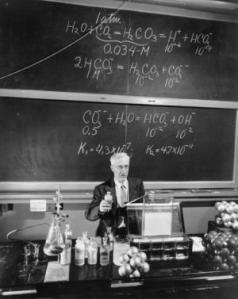
Ed Wood Teaching Award finalists 2010. L-R: Anne Tierney, Graham Scott (overall winner) and Stephen McClean
Last week I was at the UK Centre for Bioscience Reps Forum in Cardiff and once again the meeting has provided a number of teaching ideas I hope to implement in the coming year. In this year’s forum we saw the introduction of a poster session which was the subject of one of the first activites in the meeting and provided discussion around various themes. Unfortunately due to “technical” difficulties at Cardiff airport I arrived late so did not get the full benefit of the posters. Our project on text messaging in higher education was presented at the event.
The afternoon saw a showcase session for the finalists of the Ed Wood Teaching award, now rebranded as the Bioscience Teacher of the Year Award. I kicked off the session describing my case study on Using Reflective Video Sharing in Year One Chemistry Laboratory Sessions. This was followed by Graham Scott from the University of Hull, the overall winner of the award who described his study on Student managed learning: Whales, Dolphins and Sharks. Anne Tierney then described her work on The role of online diaries in creating a reflexive learning environment, bringing the session to an end. All of the case studies are on the Centre website and are linked above.
The following day provided for me one of the highlights of the forum in the form of the Swapsop session: brief presentations from colleagues on an aspect of their practice. This year the line-up was as follows;
- Jon Scott, University of Leicester, ‘Home from Home: video diaries from the 2nd years’
- Nicholas Freestone, Kingston University, ‘Differentiated learning: the Kingston MPharm experience’
- Ian Turner, University of Derby, ‘Lonely Hearts Columns – A Novel Way of Teaching Students Abstract Writing Skills’ as an INTERACTIVE SWAPSHOP
- Dave Lewis, University of Leeds, ‘Using short video clips to promote the discussion of ethical issues in science’
- Iain Coleman, University of Wolverhampton, ‘Does a spoonful of dictation sugar help the electronic marking medicine go down?’
- Peter Klappa, University of Kent at Canterbury, ‘Teaching with Animations’
I enjoyed all of these sessions but as usual was most inspired by the technology-centred sessions and found Peter Klappa’s demonstration of LightScribe most engaging. This is a method for capturing lectures where tablet technology is used; the software captures audio from the speaker as well as the text written on the tablet. A final video can then be output for hosting on a VLE.
All in all another great Reps Forum; hopefully there will be many more to come….
Photo credit: Terry McAndrew



